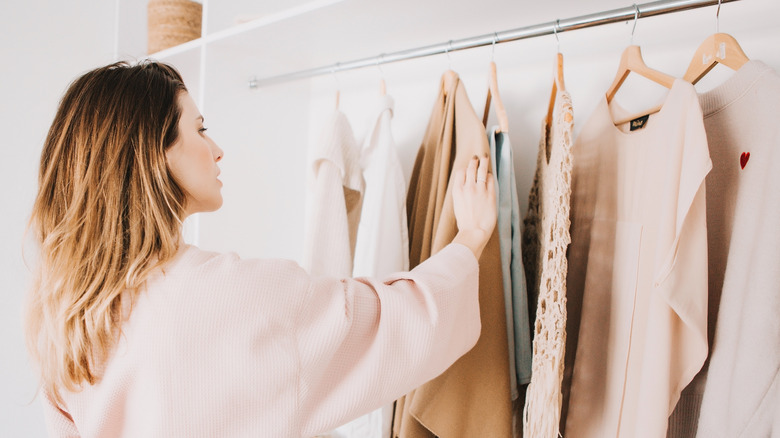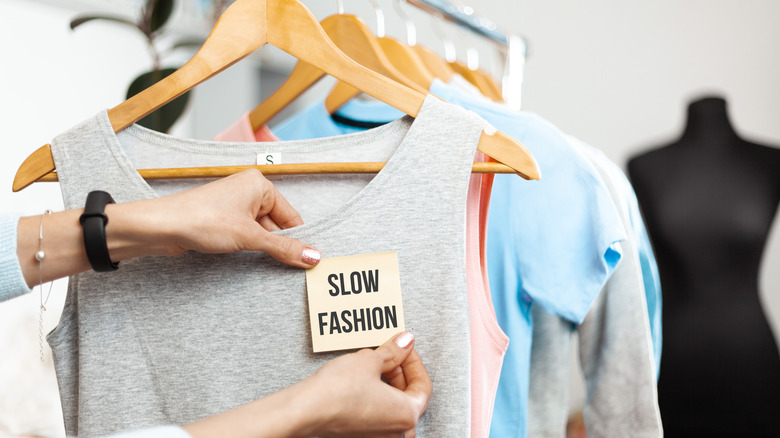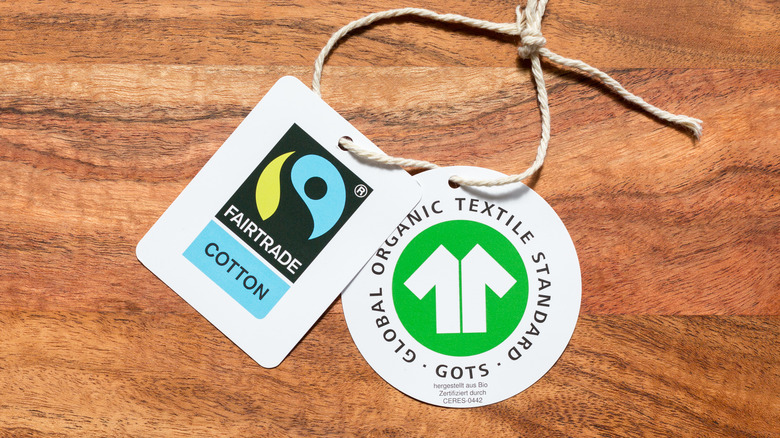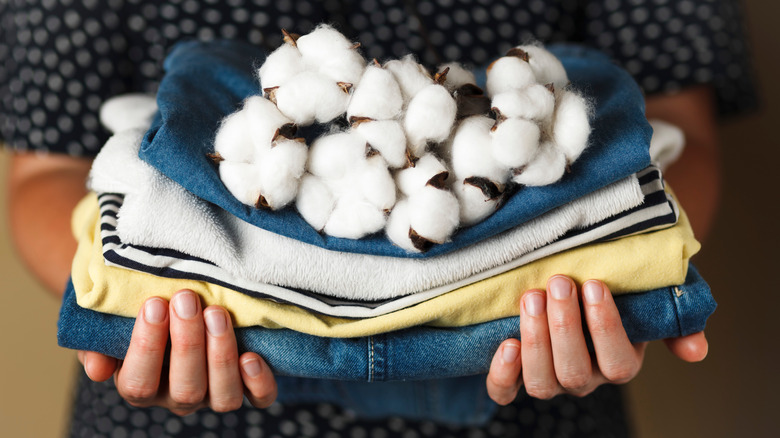The Truth About Cruelty-Free Fashion
If we learned anything from "The Good Place," it's that one small action can have a ripple effect of other impacts. The show used the example of the nice action of buying flowers that had the unanticipated negative impact on the world — flowers grown using toxic pesticides, picked by migrant workers, ordered via cell phone manufactured in a sweatshop, etc (from Vox). It turns out buying clothes can have unanticipated negative consequences, particularly with fast fashion — which is cheap clothing that's made quickly to capitalize on trends and are often only worn a handful of times (via Good on You). The opposite of fast fashion would be cruelty-free fashion, also known as ethical fashion.
Cruelty-free and ethical fashion isn't one single official designation by any organization or government, and it is used differently by different people. For some, cruelty-free fashion is the same as vegan fashion — clothing that doesn't use any animal products at all (via Slow Nature). That makes feathers, fur, silk, leather, and wool all off limits. PETA even has its own logo for items that are vegan (via PETA). But keep in mind that some vegan clothing, like plastic-based vegan leather, could still have negative environmental impacts (via Harper's Bazaar).
Cruelty-free fashion is all about reducing negative impact on workers and the world
That brings us to a second element to consider when it comes to cruelty-free fashion. It ideally should also describe clothing that is made and distributed with the least negative environmental impact. Fashion that's created with the primary focus of reducing its impact on the planet, is often referred to as sustainable fashion or eco-fashion (from Green Dreamer).
Alongside not harming animals or the planet, a third element of cruelty-free fashion is the consideration of how the workers who make the clothing are treated and paid and what the working conditions are like. Often fast fashion is made by underpaid young women in dangerous conditions (via Borgen Magazine). In 1989, the Clean Clothes Campaign was started, and it's now a collection of over 200 organizations that is continuing to tackle issues in the fashion industry, including unsafe working conditions, poverty wages, migrant exploitation and more.
Slow fashion — inherently the opposite of fast fashion — is another phrase similar to cruelty-free fashion; slow fashion is clothing that has positive environmental and social impacts (from The Good Trade). But slow fashion may not necessarily be vegan / animal-free.
There's no one definition for ethical or cruelty-free fashion
If you're looking to make your closet a more ethical one, there's no one perfect product or brand, it comes down to having to do some research about different brands and understanding different certifications. Again, there's no one definition for what is ethical or cruelty-free, but here are a few of the largest worldwide certifications that can help you build a more sustainable wardrobe.
One certification to look for is B-Corp; according to their website, B Corp Certification is "measures a company's entire social and environmental performance." A few fashion brands you may recognize that have this certification: Patagonia, All Birds, Bombas, and Eileen Fisher (from B-Corp).
Another is Fair Trade Certified, which means the business has met certain "requirements around worker's rights, fair labor practices, and responsible land management." Outerknown, People Tree, and Indigenous are just a few of the companies with Fair Trade certified stylish clothing (via The Good Trade).
Adopt the motto 'buy better and buy less'
There are also certifications specific to clothing. Bluesign is a Swiss organization that monitors businesses along the textile supply chain, and if you see their product certification, it signals items were made with as few harmful chemicals as possible and in ways that were safe for the planet (via Good On You). Prana has a line of Bluesign certified items, as does Adidas and Brooks.
Then there's the Global Organic Textile Standard (GOTS), which is the world's standard for textile processing; if something is GOTS certified, the product is at least 70% organic, the workers make a decent income, and the company is working to protect the environment (via GOTS). PACT, the Colorado based clothing company, is GOTS certified, as is Synergy (from The Good Trade).
None of these certifications means the items have zero negative impact at this point, but they do signal the best options for cruelty-free and sustainable options. And it's also true that many of these slow fashion products are currently more expensive than their fast fashion counterparts, but consider adopting the mantra to "buy better and buy less" (via Vogue).



